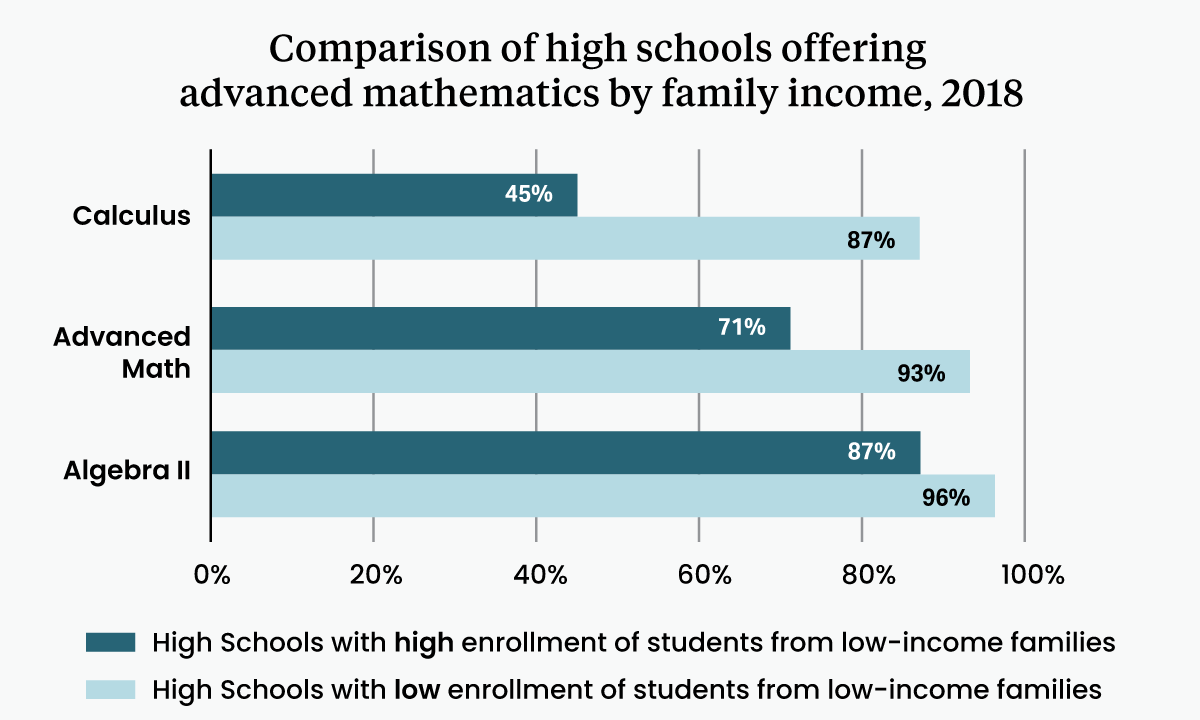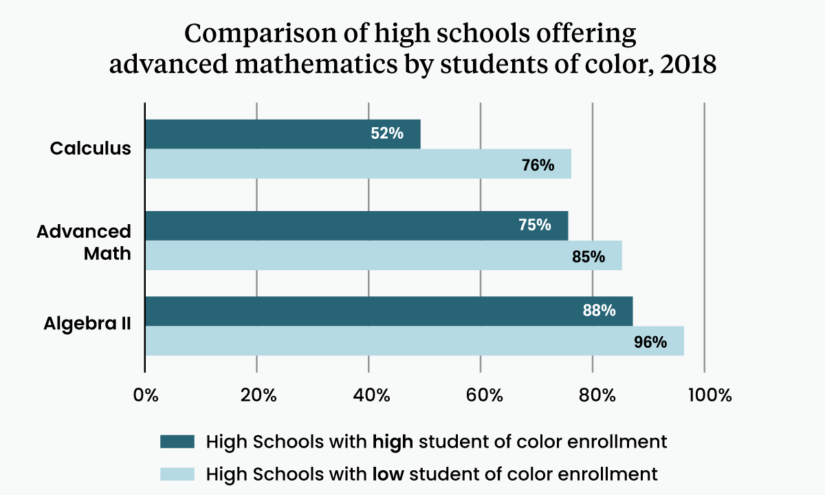‘A Bankrupt Concept of Math’: Some Educators Argue Calculus Should Be Dethroned
A course critics say is outdated, inaccessible and not needed for success in humanities — or STEM — is still seen as critical to college

Get stories like this delivered straight to your inbox. Sign up for The 74 Newsletter
Successful completion of high school calculus has long been an unofficial must-have for those seeking admission to the nation’s top colleges: The course has, for decades, served as a signal to admissions officers that a student’s coursework has been robust.
But some in education say it’s time to reconsider this de facto requirement: Many schools — particularly those serving large numbers of Black, Hispanic or low-income students — don’t offer the course. And even when they do, it’s of dubious value, they say.

“High school calculus is a complete waste of time and a form of torture,” said Alan Garfinkel, professor of integrative biology and physiology and medicine at UCLA. “The view … that math is a bunch of symbolic expressions, and you bang on them with tricks to get other symbolic expressions, is a bankrupt concept of math, dating from the 19th century.”
The course, as it’s often taught at the high school level, is inaccessible and often perceived as irrelevant to students’ interests, critics say. Just 16% of high school graduates earned credit for calculus in 2019, according to data culled by the National Assessment of Educational Progress, a statistic no doubt shaped by its unavailability.
Only 52% of schools with high student of color enrollment offered the course in 2017-18 compared to 76% of schools with low student of color enrollment, according to a 2021 report from the Learning Policy Institute.

The study, which analyzed data primarily from the U.S. Department of Education’s Civil Rights Data Collection, found the course was also scarce in more impoverished communities: Just 45% of high schools enrolling a high proportion of students from low-income families offered the class compared to 87% of high schools with a low proportion of these students.
In addition to its uneven availability, some say calculus isn’t entirely relevant to college-level studies and that other classes, including those in statistics and data science, should be considered just as worthy.
“There is a perception that calculus is required for admission to selective colleges, regardless of the fact that only about a handful of higher ed institutions in the U.S. actually require the course for all students,” said Melodie Baker, national policy director at Just Equations, an organization that promotes math policies that support equity in college readiness and success.
The push for calculus, said Dave Kung, director of policy at the Charles A. Dana Center, harkens back to an earlier era in U.S. history: It was all about producing physicists and engineers to beat the Soviets in various ways. Other mathematics, including statistics and linear algebra, took a back seat, he said.

“The fact that calculus is the default college math pathway is an artifact of a time that’s now long gone,” he said. “Other branches of mathematics have risen in importance in the digital age, but our curriculum hasn’t been updated to reflect that change.”
Sarah Spence Adams, professor of mathematics at Olin College of Engineering in Needham, Massachusetts, said she understands why high school counselors place such power in the course: College admissions officials had come to rely upon it, perhaps unfairly.
“Without that stamp of approval, it may be seen as harder and more labor intensive to determine if college applicants have pushed themselves academically,” said Spence Adams, who also teaches electrical and computer engineering.
She does not believe a single course is necessary for college success.
“I am rightfully worried that the disproportionate focus on calculus is unfairly excluding students, particularly students who come from backgrounds that have been historically excluded — and are still being excluded — from STEM majors and the well-paying careers that can follow,” she said.

Access to the course varies across the country, influenced by race and wealth. Only 27% of New York state high schools with high student-of-color enrollment offered calculus compared to 81% of schools with low student-of-color enrollment, The Learning Policy Institute found. In New Jersey, the organization reported, the difference was 50 percentage points: It was 49 percentage points in Maryland, Ohio and Pennsylvania.
Those who question calculus’s importance are not just considering students who wish to pursue the humanities: They say it might not be a necessity for those who want careers in STEM.
“A background in calculus is certainly helpful — and many colleges do expect it for students pursuing STEM degrees — but research shows that deeper mastery of prerequisites for calculus is more important than calculus itself,” Baker said. “High school students should not rush through the curriculum to take the course. And even most selective colleges can support students who didn’t have access to calculus in high school.”
Bill Tucker, senior advisor of the Pathways Program at the Bill & Melinda Gates Foundation, said the current sequence of mathematics courses from middle to high school means many students are being placed on a track starting in the fifth grade.
Oftentimes, he said, neither they nor their parents know why, but the availability of algebra at the 7th- or 8th-grade level also can be a predictive factor.
“Students are on the calculus track — or not,” Tucker said, adding all high schoolers should have the option of taking the course.
The Gates Foundation has devoted $1.1 billion over the next four years — the start of a decade-long pledge — with the goal of improving the availability and quality of mathematics instruction to students across the country with a focus on Black, Latino and low-income children.
The money, which arrives after years of pandemic strain and related learning loss — particularly in mathematics — will support the creation and use of high-quality instructional materials designed to increase student motivation, engagement and persistence.
It will also be used to boost the number of teachers prepared to provide top-notch math instruction and to better align the math course pathways leading from high school to college.
“Having calculus as the gatekeeper for competitive college admissions doesn’t make sense because of all of the inequities … and because it is taking one form of math and giving it a special place,” he said. “We want to have that equal opportunity … but we don’t want to make it so every student has to go to that door.”
Baker was among several who said the unofficial standard must change.
“The focus on calculus in high school is a vicious cycle that needs to stop: It’s inequitable and will not lead to a stronger body of college applicants or a stronger society,” she said. “It will lead to more of the same and delay 21st-century advancement that relies on data and technology.”
Disclosure: The Bill & Melinda Gates Foundation provides financial support to The 74.
Get stories like these delivered straight to your inbox. Sign up for The 74 Newsletter

;)
